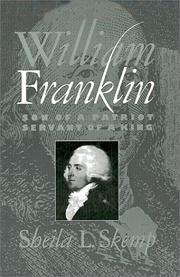| Listing 1 - 5 of 5 |
Sort by
|

ISBN: 1280539933 0195363396 9780195363395 0195057457 9780195057454 0197718027 Year: 1990 Publisher: New York Oxford University Press
Abstract | Keywords | Export | Availability | Bookmark
 Loading...
Loading...Choose an application
- Reference Manager
- EndNote
- RefWorks (Direct export to RefWorks)
A biography of Benjamin Franklin's illegitimate son, who served a long tenure as Governor of New Jersey, and was arrested and jailed for supporting the British during the American Revolution. The book sheds light on imperial issues and personalities during the Revolutionary period.
Governors --- American loyalists --- Statesmen's children --- Statesmen --- Children --- Statesmen's families --- Franklin, William, --- Franklin, Benjamin, --- Franklin, Venīamin, --- Franklin, V. --- Firānklīn, Binzhāmīn, --- Fu-lan-kʻo-lin, --- Fu-lan-kʻo-lin, Mu-chieh-ming, --- Franklin, Ben, --- Franklin, --- Franklin, B. --- Franklin, Beniamino, --- Tradesman of Philadelphia, --- Pirāṅḷin̲, Peñcamin̲, --- Франклин, Бенджамин, --- Franklin, Bendzhamin, --- פראנקלין, בנימין --- פראנקלין, בנימין, --- فرانكلين، بنجامين، --- فرانكلين، بنيامين --- فرانكلين، بنڇامين --- 富兰克林, --- Saunders, Richard, --- Family. --- New Jersey --- Politics and government
Book
ISBN: 0812222482 1283891026 0812203526 0812241401 Year: 2009 Publisher: University of Pennsylvania Press
Abstract | Keywords | Export | Availability | Bookmark
 Loading...
Loading...Choose an application
- Reference Manager
- EndNote
- RefWorks (Direct export to RefWorks)
Judith Sargent Murray (1751-1820), poet, essayist, playwright, and one of the most thoroughgoing advocates of women's rights in early America, was as well known in her own day as Abigail Adams or Martha Washington. Her name, though, has virtually disappeared from the public consciousness. Thanks to the recent discovery of Murray's papers-including some 2,500 personal letters-historian Sheila L. Skemp has documented the compelling story of this talented and most unusual eighteenth-century woman.Born in Gloucester, Massachussetts, Murray moved to Boston in 1793 with her second husband, Universalist minister John Murray. There she became part of the city's literary scene. Two of her plays were performed at Federal Street Theater, making her the first American woman to have a play produced in Boston. There as well she wrote and published her magnum opus, The Gleaner, a three-volume "miscellany" that included poems, essays, and the novel-like story "Margaretta." After 1800, Murray's output diminished and her hopes for literary renown faded. Suffering from the backlash against women's rights that had begun to permeate American society, struggling with economic difficulties, and concerned about providing the best possible education for her daughter, she devoted little time to writing. But while her efforts diminished, they never ceased.Murray was determined to transcend the boundaries that limited women of her era and worked tirelessly to have women granted the same right to the "pursuit of happiness" immortalized in the Declaration of Independence. She questioned the meaning of gender itself, emphasizing the human qualities men and women shared, arguing that the apparent distinctions were the consequence of nurture, not nature. Although she was disappointed in the results of her efforts, Murray nevertheless left a rich intellectual and literary legacy, in which she challenged the new nation to fulfill its promise of equality to all citizens.
Women and literature --- Feminism and literature --- Feminists --- Authors, American --- Literature --- American authors --- History --- Women authors --- Murray, Judith Sargent, --- Constantia, --- Citizen of Richmond, Va., --- Literature and feminism --- American History. --- American Studies. --- Autobiography. --- Biography. --- Cultural Studies. --- Gender Studies. --- Literature. --- Women's Studies.
Book
ISBN: 9780812203523 Year: 2011 Publisher: Philadelphia
Abstract | Keywords | Export | Availability | Bookmark
 Loading...
Loading...Choose an application
- Reference Manager
- EndNote
- RefWorks (Direct export to RefWorks)
Multi
ISBN: 9780812203523 9780812241402 Year: 2011 Publisher: Philadelphia, Pa University of Pennsylvania Press
Abstract | Keywords | Export | Availability | Bookmark
 Loading...
Loading...Choose an application
- Reference Manager
- EndNote
- RefWorks (Direct export to RefWorks)
Book
ISBN: 0878051937 Year: 1983 Publisher: Jackson University Press of Mississippi
Abstract | Keywords | Export | Availability | Bookmark
 Loading...
Loading...Choose an application
- Reference Manager
- EndNote
- RefWorks (Direct export to RefWorks)
| Listing 1 - 5 of 5 |
Sort by
|

 Search
Search Feedback
Feedback About UniCat
About UniCat  Help
Help News
News